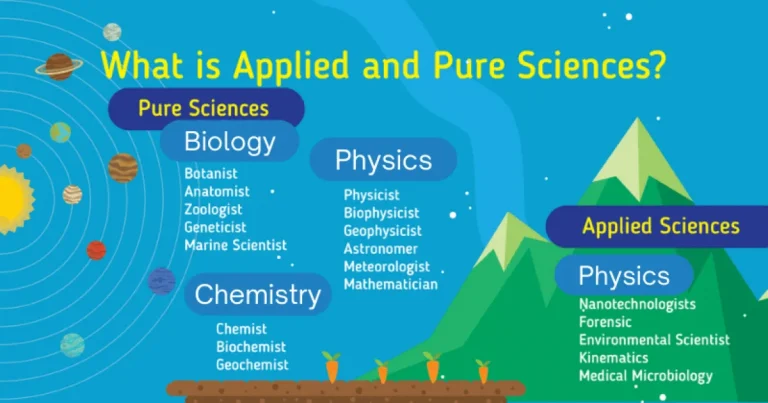Is Chemistry Math Or Science?
Chemistry utilizes aspects of both math and science to study the properties and interactions of matter. But is chemistry fundamentally a math or a science? This is a complex question with arguments on both sides.
If you’re short on time, here’s the quick answer: Chemistry is primarily considered a branch of science, but relies heavily on mathematical principles and computation. So it exists at the intersection of math and science.
Defining Math and Science
Math: Numerical, analytical thinking
Mathematics is a discipline that deals with numbers, quantities, and shapes. It involves the study of patterns and relationships through logical reasoning and analytical thinking. Math is often considered a universal language because its concepts and principles can be applied across different fields and cultures.
It provides a structured framework for problem-solving and critical thinking, allowing us to understand and describe the world in a precise and quantitative way.
Mathematics plays a crucial role in numerous scientific disciplines, including chemistry. The use of mathematical equations and formulas helps chemists to model chemical reactions, analyze experimental data, and make predictions about the behavior of substances.
For example, the field of quantum mechanics, which describes the behavior of molecules and atoms, relies heavily on mathematical calculations to understand and predict their properties.
Did you know? Without math, we wouldn’t be able to calculate the ratios of reactants in a chemical reaction or determine the concentration of a solution. Math provides the necessary tools to quantify and measure the world of chemistry!
Science: Experimental, evidence-based
Science, on the other hand, is a systematic and evidence-based approach to understanding the natural world. It involves the observation, experimentation, and analysis of phenomena to develop theories and explanations.
Science relies on empirical evidence and the scientific method, which involves formulating hypotheses, conducting experiments, and drawing conclusions based on the results.
Chemistry is a branch of science that focuses on the study of matter, its properties, and the changes it undergoes. By conducting experiments and gathering data, chemists are able to uncover new knowledge about the behavior and interactions of different substances.
This information is vital for various applications, including drug development, environmental analysis, and materials science.
It’s important to note that while math is an essential tool in scientific research, science goes beyond mere calculations. The experimental nature of science allows for the discovery of new phenomena and the development of theories that can explain and predict natural phenomena.
Did you know? Chemistry is often referred to as the “central science” because it connects and overlaps with other scientific disciplines, such as physics, biology, and geology. It provides a foundation for understanding the world at the atomic and molecular level!
Mathematical Foundations of Chemistry
Chemistry is often referred to as a combination of math and science, as it heavily relies on mathematical principles and calculations. The mathematical foundations of chemistry are essential for understanding and predicting the behavior of molecules and reactions.
By utilizing various mathematical concepts, chemists are able to make accurate measurements, analyze data, and develop theories that explain the behavior of matter.
Arithmetic
Arithmetic lays the groundwork for mathematical calculations in chemistry. It involves basic operations such as addition, subtraction, multiplication, and division. Chemists frequently use arithmetic to calculate quantities, concentrations, and conversions between different units of measurement.
For example, determining the number of moles of a substance in a given sample involves simple arithmetic calculations.
Algebra
Algebra is another fundamental branch of mathematics that plays a crucial role in chemistry. It involves the use of variables and symbols to represent unknown quantities and relationships between them.
In chemistry, algebraic equations are commonly used to express the stoichiometry of chemical reactions, allowing chemists to determine the amounts of reactants and products involved.
Geometry
Geometry is the study of shapes, sizes, and properties of objects. In chemistry, geometry is particularly important when examining molecular structures and their three-dimensional arrangements. Understanding the geometry of molecules is crucial for predicting their reactivity, stability, and interactions with other substances.
Geometric principles also play a role in spectroscopy, which analyzes the interaction of light with matter to determine molecular properties.
Calculus
Calculus is a branch of mathematics that deals with rates of change and accumulation. In chemistry, calculus is used to describe how quantities change over time, such as the rate at which a reactant is consumed or a product is formed in a chemical reaction.
Calculus is also utilized in thermodynamics, which studies the transfer of heat and energy in chemical systems.
The mathematical foundations of chemistry are interconnected, and a solid understanding of arithmetic, algebra, geometry, and calculus is crucial for mastering the subject. By applying mathematical principles, chemists are able to make accurate predictions, solve complex problems, and further our understanding of the world at the molecular level.
Scientific Methods in Chemistry
Experiments
In chemistry, conducting experiments is a crucial part of the scientific method. Through experiments, chemists can gather data and observe chemical reactions in order to understand the behavior of different substances.
These experiments involve carefully controlled conditions and precise measurements to ensure accurate results. For example, chemists may mix different chemicals together and observe the changes in color, temperature, or the formation of new substances.
These experiments help chemists uncover new properties of substances, develop new materials, and advance our understanding of the world around us.
Observations
Observation is another important aspect of the scientific method in chemistry. Chemists use their senses to make careful observations of chemical reactions, substances, and their properties. These observations can include visual cues such as color changes, physical changes like the formation of bubbles or precipitation, or changes in temperature or pressure.
By making detailed and accurate observations, chemists can gather valuable information to help them understand the behavior and properties of different substances. These observations often serve as the basis for further investigations and experiments.
Hypothesis Testing
Hypothesis testing is a fundamental part of the scientific method in chemistry. Chemists propose hypotheses, or educated guesses, to explain observed phenomena or predict the outcome of experiments. These hypotheses are then tested through further experiments and observations.
If the results of the experiments support the hypothesis, it may become a theory or a widely accepted explanation of a phenomenon. If the results do not support the hypothesis, it may be modified or discarded, and a new hypothesis may be proposed.
This iterative process of hypothesis testing allows chemists to refine their understanding of chemical principles and phenomena.
Chemistry is a unique blend of both math and science. While mathematical calculations play a crucial role in many aspects of chemistry, such as determining quantities, calculating reaction rates, or analyzing data, chemistry is ultimately a scientific discipline.
Chemists use scientific methods, including experiments, observations, and hypothesis testing, to study the behavior and properties of substances. By employing these methods, chemists are able to make discoveries, develop new materials, and contribute to our understanding of the world around us.
Applications of Math in Chemistry
Chemistry is a field that relies heavily on mathematical concepts and calculations. In fact, many would argue that chemistry is both a science and a branch of applied mathematics. The use of math in chemistry allows scientists to make accurate predictions, analyze experimental data, and understand the underlying principles of chemical reactions.
Here are some key areas where math is applied in chemistry:
Reaction Kinetics
One of the fundamental areas where math is used in chemistry is reaction kinetics. Reaction kinetics involves studying the rates at which chemical reactions occur and understanding the factors that influence these rates.
Math allows chemists to quantify the rate of a reaction, determine the order of reaction, and model the behavior of reactants over time. This information is crucial for designing efficient industrial processes, optimizing reaction conditions, and predicting reaction outcomes.
Quantum Mechanics
Quantum mechanics, a branch of physics that underpins chemical theory, heavily relies on mathematical calculations. It provides a framework for understanding the behavior of atoms and molecules at the microscopic level.
By using mathematical equations, scientists can determine the energy levels of electrons in atoms, predict the shapes of molecular orbitals, and calculate the probabilities of different electron configurations.
These calculations are essential for predicting the reactivity and properties of chemical compounds.
Thermodynamics
Thermodynamics is another area where math plays a crucial role in chemistry. It deals with the study of energy and its transformations in chemical systems. Math is used to calculate thermodynamic properties such as enthalpy, entropy, and Gibbs free energy.
These calculations help chemists understand the direction and extent of chemical reactions, as well as predict the conditions under which reactions are spontaneous or non-spontaneous. Thermodynamics is essential for designing efficient processes in industries such as pharmaceuticals, petrochemicals, and energy production.
Chemistry as a Multidisciplinary Science
Chemistry is often considered to be a multidisciplinary science, as it incorporates concepts and principles from various other scientific disciplines. This multidisciplinary nature of chemistry allows it to seamlessly overlap with other fields, such as physics and biology, leading to a deeper understanding of the world around us.
Overlap with Physics
One area where chemistry overlaps with physics is in the study of atomic and molecular interactions. Both chemistry and physics delve into the fundamental principles that govern the behavior of matter at the atomic and subatomic levels.
For example, the study of chemical bonding and the behavior of electrons in atoms and molecules involves concepts from both chemistry and physics. Understanding these concepts is crucial for explaining and predicting chemical reactions and the properties of different substances.
In addition, the study of thermodynamics is another area where chemistry and physics intersect. Thermodynamics deals with the energy transformations that occur during chemical reactions and physical processes.
It provides a framework for understanding the relationships between energy, temperature, and entropy. By applying thermodynamic principles, chemists can determine the feasibility and spontaneity of reactions, as well as calculate important quantities like heat capacity and enthalpy changes.
Applications in Biology
Chemistry also plays a vital role in the field of biology. Many biological processes, such as enzyme catalysis, cellular respiration, and DNA replication, are fundamentally chemical in nature. Understanding the chemical reactions and interactions that occur within living organisms is crucial for unraveling the complexities of life.
One area where chemistry and biology intersect is in the study of biochemistry. Biochemistry focuses on the chemical processes and substances that occur within living organisms. It explores how molecules like proteins, carbohydrates, and lipids interact and function in biological systems.
By studying the chemical reactions that drive these processes, biochemists can gain insights into the mechanisms behind diseases and develop new treatments.
Furthermore, medicinal chemistry is a branch of chemistry that aims to discover and design new drugs. It involves the synthesis and characterization of chemical compounds that can be used to treat diseases.
Medicinal chemists work closely with biologists and pharmacologists to understand the biological targets and mechanisms of action of potential drugs, and optimize their chemical properties for therapeutic use.
Conclusion
While math is integral to chemistry, chemistry is primarily considered a natural science due to its emphasis on experimental study and description of the natural world. However, chemistry exists at the intersection of math and science – it applies mathematical rigor to empirical, scientific investigation of matter and its transformations.
This interdisciplinary nature is what makes chemistry such an essential, fundamental science.







